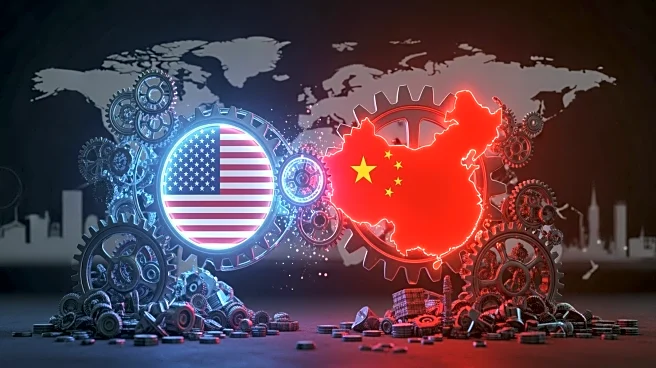What's Happening?
Top U.S. officials have accused China of betraying a trade truce reached earlier this year, escalating tensions between the two economic giants. U.S. Trade Representative Jamieson Greer and Treasury Secretary
Scott Bessent criticized China's plans to curb exports of rare earths, labeling it as 'economic coercion' and a 'global supply chain power grab.' China processes around 90% of the world's rare earths, which are critical for advanced tech manufacturing. The new rules require foreign companies to obtain Chinese government approval to export products containing rare earths and explain their intended use. Additionally, China announced similar restrictions on lithium batteries and graphite exports. In response, President Trump threatened to impose a 100% tariff on imports from China and draft export controls on critical software.
Why It's Important?
The escalating trade tensions between the U.S. and China could have significant implications for global supply chains, particularly in the technology sector. Rare earths are essential for manufacturing various tech products, and China's dominance in this area poses a vulnerability for U.S. firms. The potential tariffs and export controls could lead to increased costs for American companies reliant on Chinese materials, affecting their competitiveness. Furthermore, the strained relations may prompt other countries to reconsider their trade dependencies on China, potentially leading to a shift in global trade dynamics.
What's Next?
The U.S. and China have started charging new port fees on each other's ships, indicating further strain in their relationship. The U.S. is drafting measures to impose export controls on critical software, which could impact tech companies. Negotiations may continue as both sides assess the feasibility and impact of the announced restrictions. The international community will be closely watching these developments, as they could influence global trade policies and alliances.
Beyond the Headlines
The trade tensions highlight the geopolitical struggle for control over critical resources and supply chains. China's actions may be seen as an attempt to leverage its dominance in rare earths to gain political and economic advantages. This situation raises ethical questions about the use of trade policies as tools for geopolitical influence and the potential consequences for global cooperation.









